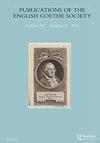The Economics of Authorship in Eighteenth-Century Germany and Britain
IF 0.1
3区 文学
0 LITERATURE, GERMAN, DUTCH, SCANDINAVIAN
引用次数: 0
Abstract
Abstract The relative backwardness of eighteenth-century German literature and the presumed ambivalence of German writers towards political power have traditionally been explained by the lack of a copyright law in Germany, which meant that German writers, in contrast to their British contemporaries, were often financially dependent on the state. This paper argues that the differences between British and German writers in economic terms have been overstated. British copyright law did not in fact serve the interests of writers to the extent that has traditionally been supposed. In Germany and Britain the situation of writers was determined more by the underlying economics of the publishing trade, especially the high cost of book production, which enabled publishers to pursue monopolistic practices and tilted the tables in favour of publishers and against writers. This argument has further implications for our understanding of the politics of German literature in the late eighteenth century.18世纪德国和英国的作家经济学
18世纪德国文学的相对落后和德国作家对政治权力的矛盾心理,传统上被解释为德国缺乏版权法,这意味着德国作家,与他们的英国同时代人相比,往往在经济上依赖于国家。本文认为,英国和德国作家在经济学方面的差异被夸大了。事实上,英国版权法并没有像传统上认为的那样为作家的利益服务。在德国和英国,作家的处境更多地是由出版业的基本经济状况决定的,尤其是图书生产的高成本,这使得出版商能够追求垄断行为,使天平向有利于出版商而不利于作家的方向倾斜。这一论点对我们理解18世纪晚期德国文学的政治有进一步的影响。
本文章由计算机程序翻译,如有差异,请以英文原文为准。
求助全文
约1分钟内获得全文
求助全文
来源期刊

Publications of the English Goethe Society
LITERATURE, GERMAN, DUTCH, SCANDINAVIAN-
CiteScore
0.10
自引率
0.00%
发文量
15
 求助内容:
求助内容: 应助结果提醒方式:
应助结果提醒方式:


